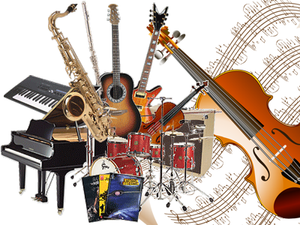 Learning a musical instrument is a great after-school activity. It enhances memory and is a great creative outlet. It is wonderful to see parents get involved in their childrens' music education.
Learning a musical instrument is a great after-school activity. It enhances memory and is a great creative outlet. It is wonderful to see parents get involved in their childrens' music education.
Sometimes parents will jump right in on day one and learn the basics of music right along with their son or daughter. For others it may not be as clear cut how to be more musically active with their children/students. I want to make this process easy enough for parents to be able to join in and learn along side their children, and it starts with learning a little music notation.
Learning and memorizing musical notes, or notation, is where the rubber meets the road. There are different methods for memorizing the notes. On the treble clef, for instance, some people use acronyms like Every Good Boy Does Fine to learn the line notes: E, G, B, D, and F.
When parents participate and learn the notes along side their sons and daughters, they are better equipped to help them practice. Much like when a parent knows basic math and english skills, the same method can be applied to help with practicing their instrument, by simply knowing some basic musical notation skills.
I’m always happy to answer questions from parents before or after a student’s lesson in order for practice time at home between the parent and child to be cohesive and productive.
I’ve asked some of my students what helped them to memorize their music notation and the overwhelming response was, I just play them over and over again. When you practice music over and over again it will eventually adhere cognitively.
Speaking of practice…you knew I was going to mention the “P” word eventually. The only way to get better at playing an instrument, or with any non-scholastic activity, is to practice. Practice outside of the music lesson is one of the most important facets to learning an instrument. As mentioned earlier, the more frequent student's play their musical notes, the sooner it will become memorized.
Practice time is not always convenient, especially if parents are busy, yet want to be involved. I recommend scheduling practice time. After finishing with homework and chores, and before getting on Netflix or Youtube, that could be an ideal time to practice. Scheduling daily practice time may be necessary if you or your child’s afternoon and evening routines are busy.
For younger students, it may take more than just “did you practice your instrument?” Parents who are active participants in their children's practice time will better assure that the younger ones are practicing their instruments as they should.
Practicing an instrument should be taken seriously as an extracurricular, but not to the same degree as homework. Practice should be relaxing and enjoyable. Turn off all distractions if possible then you can spend time with your child and his or her instrument for 20 to 30 minutes a day.
Maybe one day as the parent you may become inspired and want to take music lessons and unleash your creative outlet.
